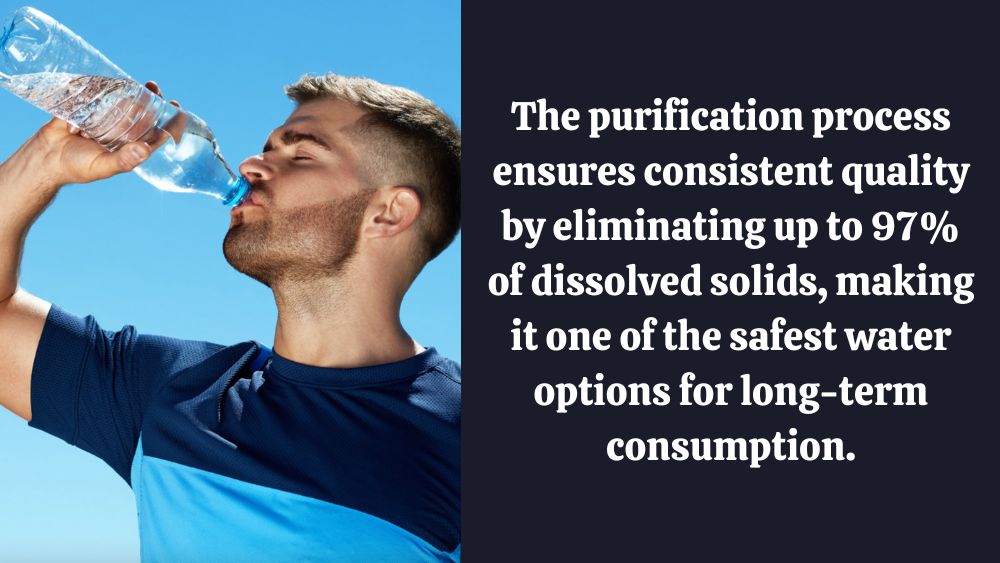Reverse osmosis (RO) has become one of the most popular water purification methods in modern homes. People trust it for removing chemicals, bacteria, and dissolved solids that may affect water safety. Yet, some wonder whether drinking RO water every day is healthy — especially since it removes both contaminants and minerals.
The short answer is yes, RO water is safe for daily drinking when properly maintained and balanced. However, because it’s demineralized, you should make sure your system includes a remineralization stage or that your diet provides sufficient calcium and magnesium. Let’s look at how RO water works, its pros and cons, and what makes it suitable for everyday use.
Key Takeaways
- RO water is safe and healthy for daily consumption when remineralized.
- The system removes up to 99% of harmful contaminants, including lead, fluoride, and pesticides.
- Lack of minerals can make the water taste flat or slightly acidic but not unsafe.
- Ideal RO drinking water should have a TDS of 80–150 ppm.
- Proper maintenance and filter replacement ensure consistent water quality and health benefits.
How RO Water Purification Works
Reverse osmosis pushes water through a semi-permeable membrane under pressure, separating clean water molecules from contaminants. This membrane blocks heavy metals, chlorine, nitrates, fluoride, and microorganisms. The system typically includes several stages — sediment filters, carbon filters, the RO membrane, and sometimes an alkaline or remineralization stage.
This process guarantees safe water but also removes beneficial minerals such as calcium, magnesium, and potassium. Because of this, some critics claim that long-term consumption of demineralized water could lead to nutrient deficiency. In reality, less than 10% of daily mineral intake comes from water, and the rest comes from food. So while RO water is low in minerals, it doesn’t significantly affect nutrient balance for most people.
Why RO Water Is Considered Safe
RO systems are trusted worldwide for their ability to remove impurities that may cause serious health issues. According to Fresh Water Systems, RO filtration eliminates chlorine, arsenic, heavy metals, and bacteria that conventional filters can’t. This makes it one of the most reliable purification methods for household use.
The safety of RO water also depends on regular maintenance. Filters should be changed every 6 to 12 months, and the membrane every 2 to 3 years, depending on water quality. Neglecting these steps can lead to bacterial buildup and reduced efficiency, which may compromise water quality.
Addressing the Mineral Removal Concern
The biggest debate around RO water involves its lack of minerals. While it’s true that calcium and magnesium are removed, the effect on overall health is minimal when you maintain a balanced diet. Foods such as leafy greens, nuts, fish, and dairy easily provide the daily required amount.
For those who prefer mineral-rich water, a remineralization filter can be added to restore calcium and magnesium after the purification stage. This not only improves taste but also slightly raises pH to a more natural range of 7.5–8.5.
If you want to learn how to optimize pH and taste, see how to adjust pH of RO water.
RO Water vs. Other Drinking Water Sources
| Water Type | Purity Level | Mineral Content | Safety | Taste |
|---|---|---|---|---|
| RO Water | 99% contaminant removal | Low (unless remineralized) | Very safe | Neutral or flat |
| Tap Water | Moderate | Moderate | Varies by source | May contain chlorine |
| Bottled Mineral Water | High | High | Safe | Pleasant, mineral taste |
| Distilled Water | Very high | None | Safe | Flat taste |
| Well Water | Variable | Variable | Risk of contamination | Depends on treatment |
This table shows that RO water provides the highest purity level among all household options, with safety only limited by maintenance.
How Often Should You Drink RO Water?
There’s no restriction on how much RO water you can drink daily. Most experts agree that 2–3 liters a day is healthy for adults. If you’re physically active, live in a hot climate, or sweat heavily, increase intake to stay hydrated.
For families using RO systems long-term, installing a remineralization filter or mixing a portion of mineral water with RO water ensures the best balance between purity and mineral intake.

Expert Insight
“RO water is completely safe for everyday use as long as the system is maintained,” says Dr. Nathan Price, a U.S. environmental health researcher. “The removal of contaminants far outweighs the concern over minerals. You can easily replace those through food or add a post-filter to restore balance.”
Health Benefits of Drinking RO Water
RO water helps prevent long-term exposure to harmful substances that may accumulate in the body. Some benefits include:
- Reduces toxin intake: Filters out lead, arsenic, mercury, and nitrates linked to neurological and kidney issues.
- Improves taste and odor: Removes chlorine and sulfur compounds responsible for unpleasant smells.
- Prevents digestive irritation: Eliminates bacteria and pathogens that can cause stomach problems.
- Supports skin health: Clean, soft water is gentle on the skin and helps maintain hydration.
For more details on what RO filtration removes, see what contaminants does reverse osmosis remove.
Does RO Water Affect Acidity or Digestion?
Pure RO water has a slightly acidic pH (about 6–6.5), but this doesn’t affect body pH. The stomach’s acidity (pH 1.5–3.5) is far stronger, and your body constantly maintains a stable blood pH around 7.4. The minor acidity of RO water is neutralized instantly upon drinking.
If you prefer a smoother taste or have acid-sensitive digestion, you can switch to an alkaline RO system. It balances pH while keeping water free from contaminants.
The Importance of Proper TDS
TDS (Total Dissolved Solids) measures the amount of minerals and salts in water. The World Health Organization recommends that drinking water have a TDS between 50 and 500 ppm, though the most preferred range for taste and safety is 80–150 ppm.
If your RO system reduces TDS too much (below 50 ppm), it can make water taste flat and reduce hydration efficiency. Using a remineralization filter or blending a small portion of mineral water helps keep levels balanced.
For guidance, see how to adjust TDS in RO water purifier.
Common Myths About RO Water Safety
Myth 1: RO water causes mineral deficiency.
False. Minerals from water account for only a small part of daily intake. Balanced nutrition provides all the necessary electrolytes.
Myth 2: RO water is too acidic.
Not true. Slightly acidic pH is harmless and doesn’t influence body chemistry.
Myth 3: RO systems waste too much water.
Modern systems with booster pumps and efficient membranes recover up to 50–60% of water, far higher than older models.
Myth 4: RO water isn’t suitable for kids or elderly people.
Incorrect. Clean, mineral-balanced RO water is actually safer for vulnerable groups since it removes pollutants and pathogens.
Myth 5: RO water strips essential nutrients from the body.
Unfounded. It simply lacks minerals — it doesn’t deplete existing nutrients.
Maintenance Tips to Keep RO Water Safe
- Change filters regularly: Replace sediment and carbon filters every 6–12 months, and the membrane every 2–3 years.
- Sanitize the system annually: Clean the tank and tubing to prevent bacterial growth.
- Monitor pressure: If your water pressure is low, use a booster pump for optimal filtration.
- Check for leaks: Regular inspection ensures system efficiency and safety.
Learn more about maintenance in how to clean and sanitize an RO system.
Why RO Water Is Safer Than Many Alternatives
Tap water often contains trace pollutants, chlorine, and industrial residues that exceed safe limits in many regions. Bottled water may seem convenient but is costly and less sustainable. RO systems provide a permanent solution — safe, fresh water on demand with minimal plastic waste.
According to APEC Water, reverse osmosis filtration meets strict standards for contaminant removal and long-term drinking safety. It’s one of the few home purification technologies that can filter down to 0.0001 microns, removing even microplastics and fluoride.
Who Should Use RO Water
- Families in urban areas exposed to industrial contaminants.
- Households with well water containing high TDS or heavy metals.
- People with sensitive digestion or immune systems.
- Health-conscious individuals who prefer clean, consistent water taste.
Environmental Impact
Modern RO systems are much more water-efficient than before. With new membranes and smart pumps, the wastewater ratio can drop to 1:1 or 2:1, depending on model and pressure. Additionally, using RO water reduces reliance on bottled water, helping decrease plastic pollution.
To further optimize performance, see how to reduce the operating cost of RO systems.
FAQs
1. Is it okay to drink RO water every day?
Yes. Daily consumption of properly maintained RO water is perfectly safe and recommended for clean hydration.
2. Does RO water cause health problems long term?
No. There’s no scientific evidence linking RO water to negative health effects. Most concerns stem from myths about minerals and acidity.
3. Can I give RO water to infants or elderly people?
Yes, but use remineralized RO water for balanced electrolytes. It’s much safer than untreated tap water.
4. How can I make RO water healthier?
Add a remineralization or alkaline cartridge, or include mineral-rich foods in your diet.
5. Does RO water taste different?
It can taste flat because of low minerals, but remineralization restores a fresh, natural flavor.
Conclusion
RO water is absolutely safe for daily drinking when the system is properly maintained and balanced. It offers superior protection against contaminants that can cause chronic health issues, ensuring cleaner and safer hydration.
By maintaining ideal TDS levels, using a remineralization filter, and following routine care, you can enjoy all the benefits of RO purification without losing essential minerals. It’s a smart choice for families, health-conscious individuals, and anyone who values safe, great-tasting water every day.

Hasan Al Sarker is a Reverse Osmosis Specialist. He has worked for many years to ensure safe drinking water for all. His research paper has been published in several journals, including Issue, Medium, and Slideshare. He is recognized as a water doctor among specialists though he did not attend medical college.
Besides working as a researcher of reverse osmosis technology, he is also very fancy with the kitchen and cooking. His guides are reading thousands of people every day. As a head of content, he is responsible for all the published articles at RO System Reviews.

